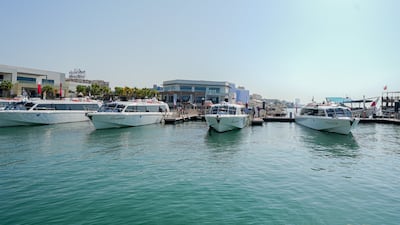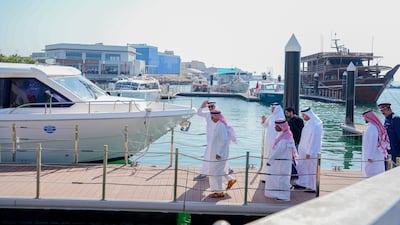A new ferry is set to carry international passengers between Bahrain and Qatar, a move aimed at attracting more visitors ahead of plans for a unified Gulf tourism visa.
The 70-minute ferry ride will connect Saadah Marina on Muharraq Island in Bahrain to Al Ruwais Port in Qatar, service operator Masar Group said in a statement on Friday.
"This strategic project ... paves the way for increased maritime travel, facilitating movement for citizens and residents, supporting tourism, and strengthening the social and cultural fabric," said Sheikh Abdullah bin Ahmed Al Khalifa, Bahrain’s Minister of Transportation and Telecommunications.
The ferry service is a "significant investment" in the maritime tourism sector and a boost to the country's economy, Sheikh Abdullah added.
The project is in line with Bahrain's Economic Vision 2030 to diversify its revenue away from oil. The move also comes amid a push to establish rail links between the six states comprising the Gulf Co-operation Council to ease the transport of people and goods. The Gulf railway project, which is scheduled to be completed in 2030, is expected to facilitate trade, boost tourism and contribute to their national economic diversification agendas.
The sea ferry service also comes ahead of the pilot launch of the Unified GCC Tourist Visa, scheduled for this quarter, to test the system before a full roll-out. The visa programme is a Schengen-style initiative that will allow non-Gulf citizens the opportunity to visit any of the six countries in the region on one visa. It is also known as the GCC Grand Tours Visa.
Masar Group, a subsidiary of Bahrain's Mumtalakat Holding Company, said the Bahrain-Qatar ferry service was a "swift and convenient" alternative to travelling by land and air. Yousif Al Mana, chief executive of the Masar Group, said passengers could book ferry trips using an app.
It comes as Bahrain is also working to boost its air links to attract more international tourists and grow its position as an aviation and logistics hub. It aims to compete in a region already packed with established travel hubs in Abu Dhabi, Dubai and Doha, while Saudi Arabia is investing heavily to develop its aviation infrastructure.
This week, Bahrain also signed an initial accord with AirAsia to set up a hub in the country. The Malaysian airline group's Capital A signed a letter of intent with Bahrain’s Transport Ministry.
Top%2010%20most%20competitive%20economies
%3Cp%3E1.%20Singapore%0D%3Cbr%3E2.%20Switzerland%0D%3Cbr%3E3.%20Denmark%0D%3Cbr%3E4.%20Ireland%0D%3Cbr%3E5.%20Hong%20Kong%0D%3Cbr%3E6.%20Sweden%0D%3Cbr%3E7.%20UAE%0D%3Cbr%3E8.%20Taiwan%0D%3Cbr%3E9.%20Netherlands%0D%3Cbr%3E10.%20Norway%0D%3Cbr%3E%3C%2Fp%3E%0A
The specs
Engine: Direct injection 4-cylinder 1.4-litre
Power: 150hp
Torque: 250Nm
Price: From Dh139,000
On sale: Now
The alternatives
• Founded in 2014, Telr is a payment aggregator and gateway with an office in Silicon Oasis. It’s e-commerce entry plan costs Dh349 monthly (plus VAT). QR codes direct customers to an online payment page and merchants can generate payments through messaging apps.
• Business Bay’s Pallapay claims 40,000-plus active merchants who can invoice customers and receive payment by card. Fees range from 1.99 per cent plus Dh1 per transaction depending on payment method and location, such as online or via UAE mobile.
• Tap started in May 2013 in Kuwait, allowing Middle East businesses to bill, accept, receive and make payments online “easier, faster and smoother” via goSell and goCollect. It supports more than 10,000 merchants. Monthly fees range from US$65-100, plus card charges of 2.75-3.75 per cent and Dh1.2 per sale.
• 2checkout’s “all-in-one payment gateway and merchant account” accepts payments in 200-plus markets for 2.4-3.9 per cent, plus a Dh1.2-Dh1.8 currency conversion charge. The US provider processes online shop and mobile transactions and has 17,000-plus active digital commerce users.
• PayPal is probably the best-known online goods payment method - usually used for eBay purchases - but can be used to receive funds, providing everyone’s signed up. Costs from 2.9 per cent plus Dh1.2 per transaction.
Why it pays to compare
A comparison of sending Dh20,000 from the UAE using two different routes at the same time - the first direct from a UAE bank to a bank in Germany, and the second from the same UAE bank via an online platform to Germany - found key differences in cost and speed. The transfers were both initiated on January 30.
Route 1: bank transfer
The UAE bank charged Dh152.25 for the Dh20,000 transfer. On top of that, their exchange rate margin added a difference of around Dh415, compared with the mid-market rate.
Total cost: Dh567.25 - around 2.9 per cent of the total amount
Total received: €4,670.30
Route 2: online platform
The UAE bank’s charge for sending Dh20,000 to a UK dirham-denominated account was Dh2.10. The exchange rate margin cost was Dh60, plus a Dh12 fee.
Total cost: Dh74.10, around 0.4 per cent of the transaction
Total received: €4,756
The UAE bank transfer was far quicker – around two to three working days, while the online platform took around four to five days, but was considerably cheaper. In the online platform transfer, the funds were also exposed to currency risk during the period it took for them to arrive.



